 Are Google about to launch a free wireless Internet service?
Are Google about to launch a free wireless Internet service?
The rumours are running at fever pitch as pundits scour around for clues and hints about a forthcoming Wi-Fi service by the Internet search engine giant.
What’s really excited us is a set of pages on Google describing a new test service called Google Wi-Fi, containing instructions on how to use its wireless desktop software, Google Secure Access, which sits on their subdomain wifi.google.com.
Listed as a set of answers to questions, the pages include a list of features and terms of the new service, with examples including:
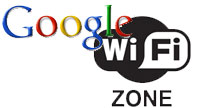 Q. “Is there a fee for using Google Secure Access? A. No, Google Secure Access is free.”
Q. “Is there a fee for using Google Secure Access? A. No, Google Secure Access is free.”
Q. “Where can I go to download Google Secure Access? A. The program can currently be downloaded at certain Google Wi-Fi locations in the San Francisco Bay area.”
Reuters picked up on the story and first ran an article saying that Google was preparing to introduce its own wireless Internet service, but this was later amended to say that they’d only begun a limited test of the wireless service.
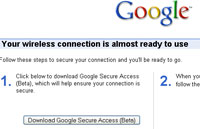 So far, Google have only introduced two wireless access points in Silicon Valley, at a pizzeria and a gymnastics centre, but it has been reported that the company were in talks with San Francisco officials about setting up public wireless networks in the city (Google currently share a single access point in Union Square in partnership with Feeva.)
So far, Google have only introduced two wireless access points in Silicon Valley, at a pizzeria and a gymnastics centre, but it has been reported that the company were in talks with San Francisco officials about setting up public wireless networks in the city (Google currently share a single access point in Union Square in partnership with Feeva.)
Typically, the company are keeping tight lipped about their plans, but with Business 2.0 reporting that Google had “quietly been shopping for miles and miles of ‘dark,’ or unused, fibre optic cable across the country” last year, the Wi-Fi service is looking increasingly probable.
A free Google Wi-Fi service would make sound business sense, providing another way for Google to sell targeted advertising, big up the brand, maintain their popular reputation for dishing out free stuff and importantly adding location-based information to their adverts.
 Although rolling out a nationwide Wi-Fi service would be a formidable task, with Google’s energy, enthusiasm (and zillions of $$$), it’s entirely possible and would no doubt be supremely popular.
Although rolling out a nationwide Wi-Fi service would be a formidable task, with Google’s energy, enthusiasm (and zillions of $$$), it’s entirely possible and would no doubt be supremely popular.
Investment site Motley Fool.com are voicing doubts about Google claiming an even bigger chunk of our online life, with their article, Why I Fear Google WiFi, investigating Google’s “big and potentially scary news.”
 In a feast of conglomeration and convergence, Internet auctioneer giants eBay are swallowing up Luxembourg-based Skype, the world’s leader in Internet phone services.
In a feast of conglomeration and convergence, Internet auctioneer giants eBay are swallowing up Luxembourg-based Skype, the world’s leader in Internet phone services. The company generates revenue by charging small fees for calls to non-Skype users and for Skype users to receive calls from callers not using the software. Skype also charge a fee to provide a voice mail service.
The company generates revenue by charging small fees for calls to non-Skype users and for Skype users to receive calls from callers not using the software. Skype also charge a fee to provide a voice mail service. No matter how hard we try, when we see someone wandering about with a Bluetooth headset in their lughole we don’t think, “there’s a cool, go-getting professional”; we tend to have an irresistible urge to shout unprintable things in their direction.
No matter how hard we try, when we see someone wandering about with a Bluetooth headset in their lughole we don’t think, “there’s a cool, go-getting professional”; we tend to have an irresistible urge to shout unprintable things in their direction. Designed to be compatible with Sony VAIO BX laptops, the HBH-608 connects the computer with the headset via Bluetooth making it possible to handle calls over the Internet (VoIP) without faffing about with troublesome phone cables.
Designed to be compatible with Sony VAIO BX laptops, the HBH-608 connects the computer with the headset via Bluetooth making it possible to handle calls over the Internet (VoIP) without faffing about with troublesome phone cables. “The knowledge from two strong brands in the communications industry comes together in this solution. We believe that our joint experience benefits the user, making telecommunication as smooth as possible.”
“The knowledge from two strong brands in the communications industry comes together in this solution. We believe that our joint experience benefits the user, making telecommunication as smooth as possible.” Best of all, when you need to pop out for a double skinny frappuccino with Bolivian gnu’s milk, the same handset can be kept in your ear and used with your Bluetooth mobile phone on the street.
Best of all, when you need to pop out for a double skinny frappuccino with Bolivian gnu’s milk, the same handset can be kept in your ear and used with your Bluetooth mobile phone on the street. Rumours hotter than a double strength vindaloo are circulating major news organisations like the Wall Street Journal, Reuters and the Web that online auctioneers eBay are in talks to acquire the Internet-telephony company Skype.
Rumours hotter than a double strength vindaloo are circulating major news organisations like the Wall Street Journal, Reuters and the Web that online auctioneers eBay are in talks to acquire the Internet-telephony company Skype.
 Siemens have announced their new Gigaset SL75 WLAN Voice-over-IP (VoIP) cordless telephone for the home.
Siemens have announced their new Gigaset SL75 WLAN Voice-over-IP (VoIP) cordless telephone for the home.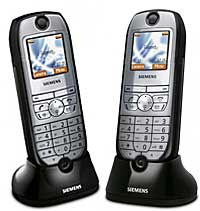 Decked out in (ahem) “the season’s high fashion colour night grey”, the Gigaset SL75 WLAN sports a colour display (128×128 pixels, 4k/65k colors) and comes with a small docking station.
Decked out in (ahem) “the season’s high fashion colour night grey”, the Gigaset SL75 WLAN sports a colour display (128×128 pixels, 4k/65k colors) and comes with a small docking station. Skype has slapped hands and manfully patted backs with German network operator E-Plus as the VoIP giant secures their first 3G partnership.
Skype has slapped hands and manfully patted backs with German network operator E-Plus as the VoIP giant secures their first 3G partnership. The busy-bee Skypesters are said to be already hatching up schemes with a number of major handset and headset manufacturers – including Motorola – to develop a broader range of offer Skype-ready devices
The busy-bee Skypesters are said to be already hatching up schemes with a number of major handset and headset manufacturers – including Motorola – to develop a broader range of offer Skype-ready devices Skype currently claims more than 2.8 million Skype users in Germany.
Skype currently claims more than 2.8 million Skype users in Germany. From deep within the Microsoft base, Bill Gates has pulled a few levers and dispatched a corporate grabbing tentacle in the direction of Teleo, a privately held provider of VoIP software and services.
From deep within the Microsoft base, Bill Gates has pulled a few levers and dispatched a corporate grabbing tentacle in the direction of Teleo, a privately held provider of VoIP software and services.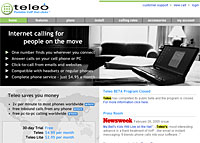 The San Francisco-based outfit Teleo was founded just two years ago and got as far offering a beta PC to PC or standard phone Skype-like VoIP service with click-to-call dialing through Microsoft Outlook and Internet Explorer before Gates grabbed the product.
The San Francisco-based outfit Teleo was founded just two years ago and got as far offering a beta PC to PC or standard phone Skype-like VoIP service with click-to-call dialing through Microsoft Outlook and Internet Explorer before Gates grabbed the product. Terms of the deal haven’t been disclosed, but Microsoft have said that members of the Teleo executive team will continue to work closely with MSN, while some Teleo product developers are expected to shuffle across and join MSN.
Terms of the deal haven’t been disclosed, but Microsoft have said that members of the Teleo executive team will continue to work closely with MSN, while some Teleo product developers are expected to shuffle across and join MSN.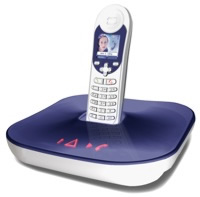 The acceptance of VoIP into the mainstream moved up a gear today with the release of a DECT VoIP handset, the plain-badly-named EV5203-C, from Thomson, the _huge_ French all-encompassing media company. The product is the first fruit from Thomson’s purchase of Inventel, earlier this year.
The acceptance of VoIP into the mainstream moved up a gear today with the release of a DECT VoIP handset, the plain-badly-named EV5203-C, from Thomson, the _huge_ French all-encompassing media company. The product is the first fruit from Thomson’s purchase of Inventel, earlier this year.
 The program, Google Talk, is based on the open source Jabber protocol and competes directly with the three major providers of instant messaging – AOL, Microsoft and Yahoo.
The program, Google Talk, is based on the open source Jabber protocol and competes directly with the three major providers of instant messaging – AOL, Microsoft and Yahoo.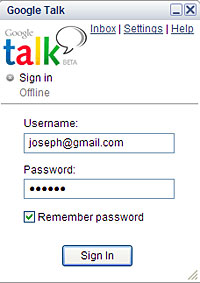 The software will let users have multiple voice sessions open at the same time, but only one can be active at any given time.
The software will let users have multiple voice sessions open at the same time, but only one can be active at any given time.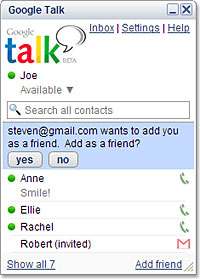 Currently, the three major messaging services are closed shops that generally don’t permit users to send messages to and from competing services – a source of continuing frustration for many IM users.
Currently, the three major messaging services are closed shops that generally don’t permit users to send messages to and from competing services – a source of continuing frustration for many IM users. Peter Saint-Andre, executive director of the Jabber Software Foundation, estimated that 13.5 million use the Jabber standard, based on figures from Osterman Research.
Peter Saint-Andre, executive director of the Jabber Software Foundation, estimated that 13.5 million use the Jabber standard, based on figures from Osterman Research. HTC are rumoured to have won the contract to manufacture the much-hyped Windows Mobile-based version of Palm’s Treo smart phone.
HTC are rumoured to have won the contract to manufacture the much-hyped Windows Mobile-based version of Palm’s Treo smart phone.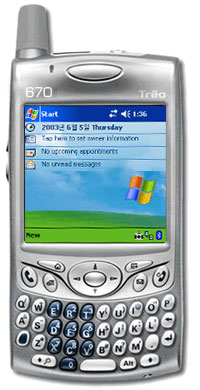 The Taiwan-based High Tech Computer (HTC) firm already manufactures its own popular suite of Windows Mobile-based smart phones and PDA-style communicators, which go under a mass of different names worldwide, depending on the mobile networks operators and handset vendors.
The Taiwan-based High Tech Computer (HTC) firm already manufactures its own popular suite of Windows Mobile-based smart phones and PDA-style communicators, which go under a mass of different names worldwide, depending on the mobile networks operators and handset vendors. Just as we went to press, another rumour flashed across the Web, with Cool Tech Times showing a fairly convincing photograph of what it reckons is the new Treo 700.
Just as we went to press, another rumour flashed across the Web, with Cool Tech Times showing a fairly convincing photograph of what it reckons is the new Treo 700.